Overview
This article presents a structured approach for sales managers in finance to achieve PCI DSS compliance through seven essential steps. It is crucial to grasp the principles of PCI DSS, implement robust security measures, and conduct regular assessments to safeguard sensitive cardholder data. Such actions not only protect customer information but also foster trust and enhance operational efficiency. By adhering to these steps, sales managers can navigate the complexities of compliance effectively, ensuring their organizations meet industry standards and maintain customer confidence.
Introduction
Understanding the Payment Card Industry Data Security Standard (PCI DSS) is essential for sales managers in finance, as it serves as a cornerstone for protecting sensitive customer data. This comprehensive guide outlines critical steps that sales leaders can take to ensure compliance, highlighting significant benefits such as enhanced customer trust and increased operational efficiency.
However, as organizations navigate the complexities of PCI DSS, they often encounter challenges that can hinder their progress. The pressing question remains: How can sales managers effectively overcome these obstacles to not only achieve compliance but also leverage it for competitive advantage?
Understand PCI DSS: Purpose and Importance
The Payment Card Industry Data Security Standard (PCI DSS) represents a critical set of security standards established to ensure that all entities involved in accepting, processing, storing, or transmitting credit card information operate within a secure environment.
Understanding the significance of PCI DSS is essential for managers, as non-compliance with PCI DSS can lead to severe repercussions, including hefty fines and a detrimental loss of customer trust.
The true value of PCI DSS lies in its capacity to safeguard sensitive cardholder data against breaches and fraud, which is vital for maintaining a competitive advantage within the finance sector.
By ensuring compliance, sales leaders can foster a secure environment that enhances customer trust and loyalty, ultimately driving revenue growth.
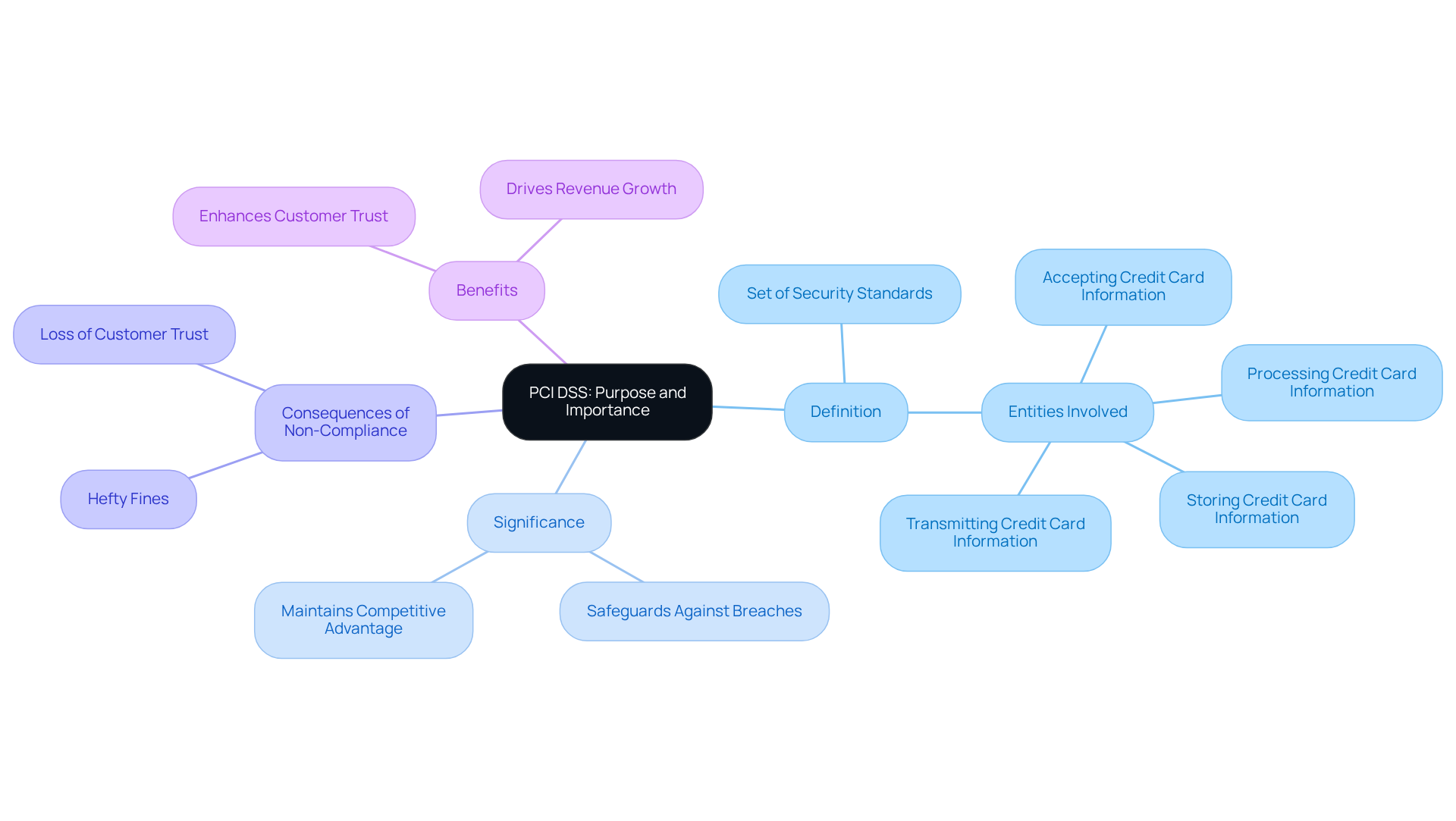
Explore the 6 Principles of PCI DSS Compliance
The six principles of PCI DSS adherence are crucial for establishing a secure environment:
- Build and Maintain a Secure Network and Systems
- Protect Cardholder Data
- Maintain a Vulnerability Management Program
- Implement Strong Access Control Measures
- Regularly Monitor and Test Networks
- Maintain an Information Security Policy
Each principle serves as a guideline, ensuring that organizations create a robust framework for security aligned with PCI DSS. For instance, implementing strong access control measures is vital, as it guarantees that only authorized personnel can access sensitive data—this is essential for maintaining customer trust and safeguarding sales transactions. Therefore, it is imperative for sales managers to familiarize themselves with these principles to effectively guide their teams in regulatory efforts and .

Review the 12 Requirements of PCI DSS
The 12 requirements of PCI DSS are categorized into six goals according to PCI DSS:
- Build and Maintain a Secure Network and Systems
- Protect Cardholder Data
- Maintain a Vulnerability Management Program
- Implement Strong Access Control Measures
- Regularly Monitor and Test Networks
- Maintain an Information Security Policy
Each requirement of the PCI DSS outlines specific actions, including installing and maintaining a firewall, encrypting the transmission of cardholder data, and regularly testing security systems. Sales managers must conduct regular reviews of these requirements to ensure their teams are compliant and to identify areas for improvement. Utilizing can significantly simplify this process by automating regulatory checks and reporting.
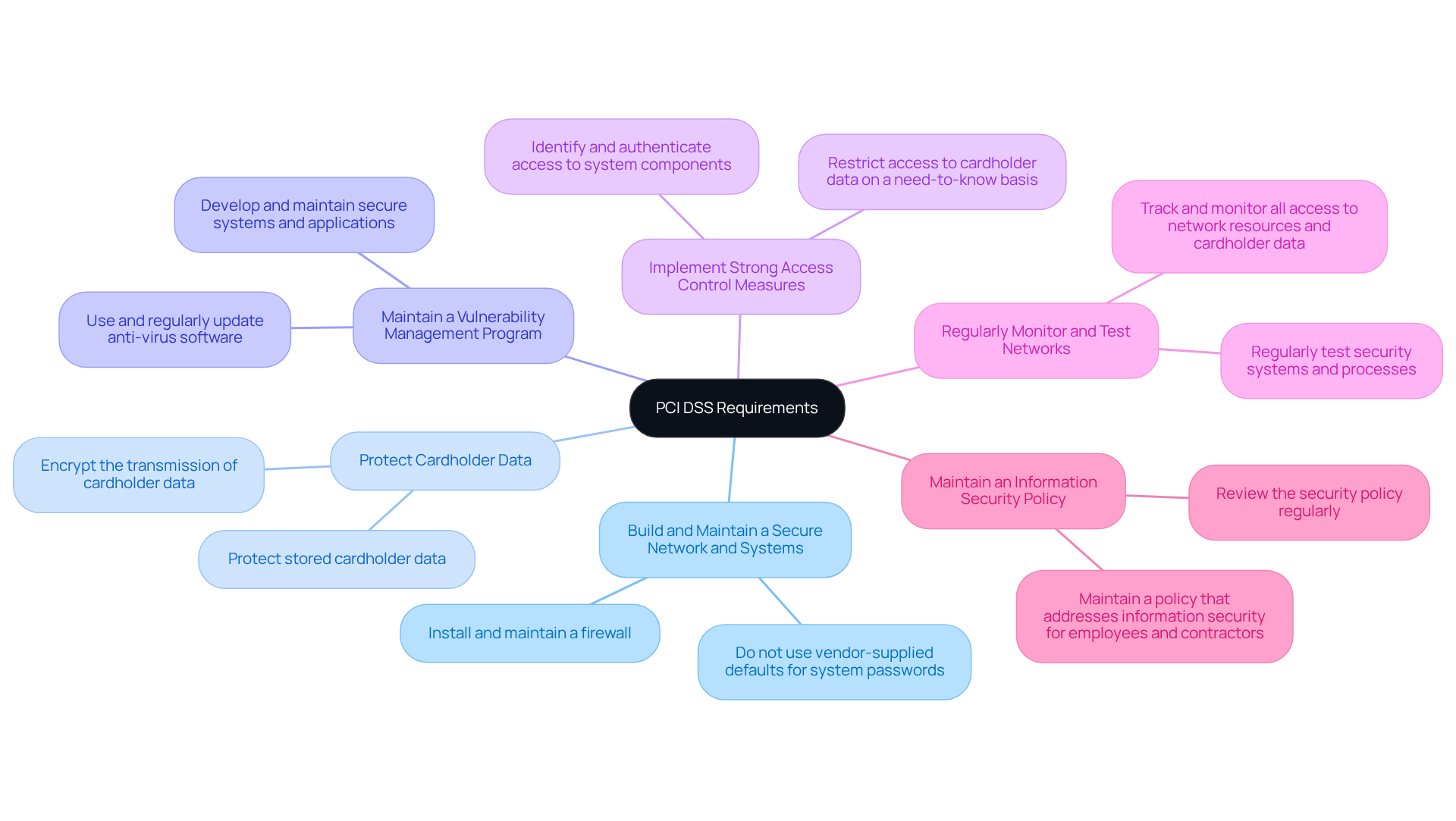
Identify PCI DSS Compliance Levels and Their Implications
The adherence levels for PCI DSS are categorized into four distinct tiers based on the volume of transactions processed annually.
- Level 1 is designated for merchants handling over 6 million transactions.
- Level 2 pertains to those managing between 1 million and 6 million transactions.
- Level 3 is for merchants processing between 20,000 and 1 million transactions.
- Level 4 relates to those managing fewer than 20,000 transactions.
Each tier encompasses specific validation criteria, which may include submitting a Self-Assessment Questionnaire (SAQ) or undergoing a formal security assessment. Understanding these levels is crucial for , as they directly influence the resources necessary for PCI DSS compliance initiatives and the potential risks associated with non-compliance.
For instance, Level 1 merchants are subjected to PCI DSS requirements, which entail more stringent measures and heightened scrutiny, demanding the implementation of robust security measures and the execution of regular audits.
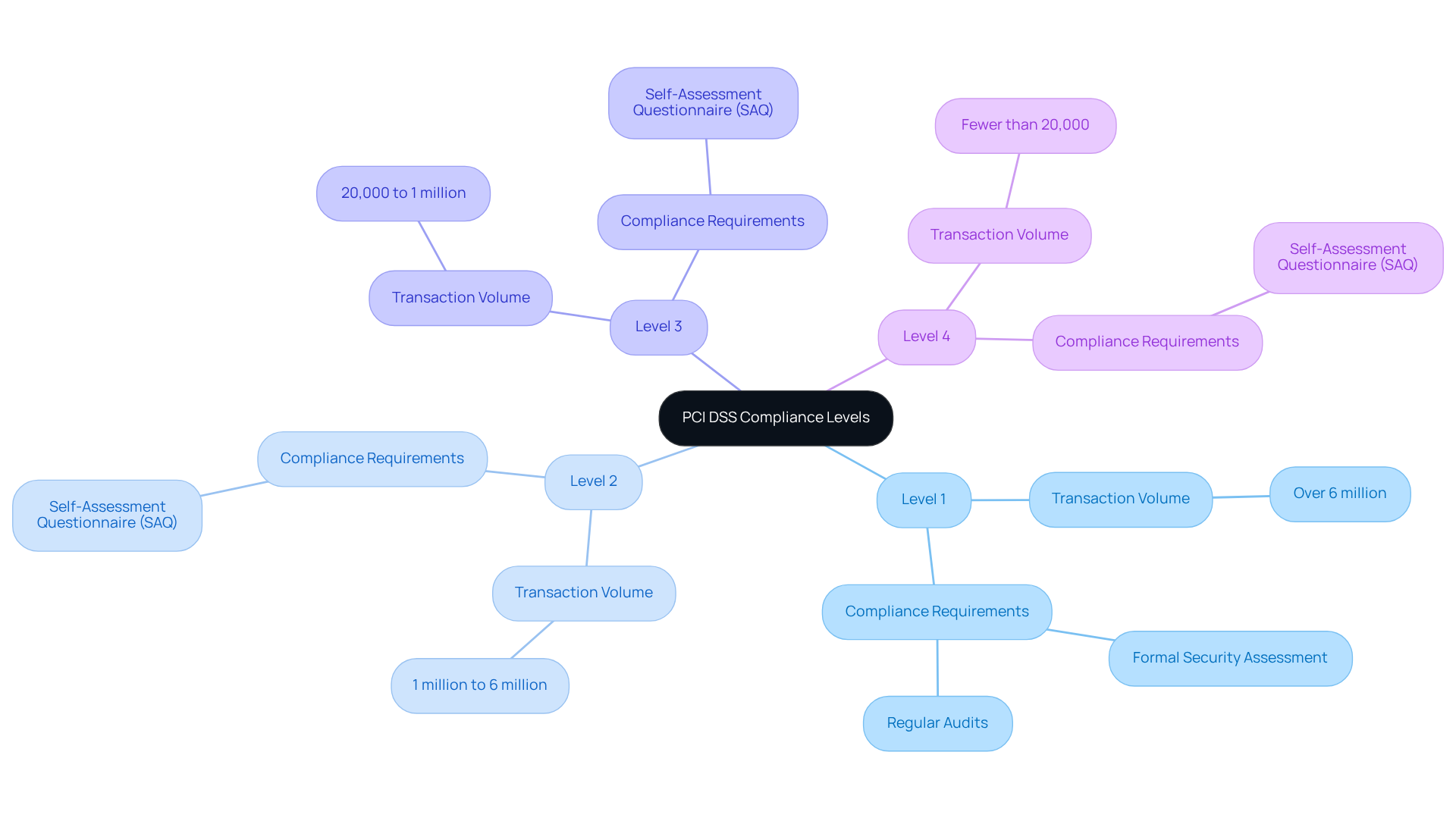
Recognize the Benefits of Achieving PCI DSS Compliance
Achieving PCI DSS presents a multitude of benefits, including enhanced customer trust, reduced risk of data breaches, and improved operational efficiency. For revenue managers, this adherence can lead to higher conversion rates, as clients feel more secure when providing their payment details. By leveraging Intone's 24/7 AI sales representatives, companies can seamlessly implement and personalize solutions that comply with regulatory protocols. Features such as the Agent editor and Telephony setup are instrumental in enhancing sales workflows.
Furthermore, Intone's smart analytics and real-time insights empower sales teams to establish clear protocols for managing sensitive data, thereby minimizing the likelihood of errors and fraud. Organizations that prioritize PCI DSS adherence, supported by Intone's , often observe a positive impact on their reputation, which translates into increased customer loyalty and retention. Additionally, adherence may result in reduced transaction fees from payment processors, ultimately boosting overall profitability.
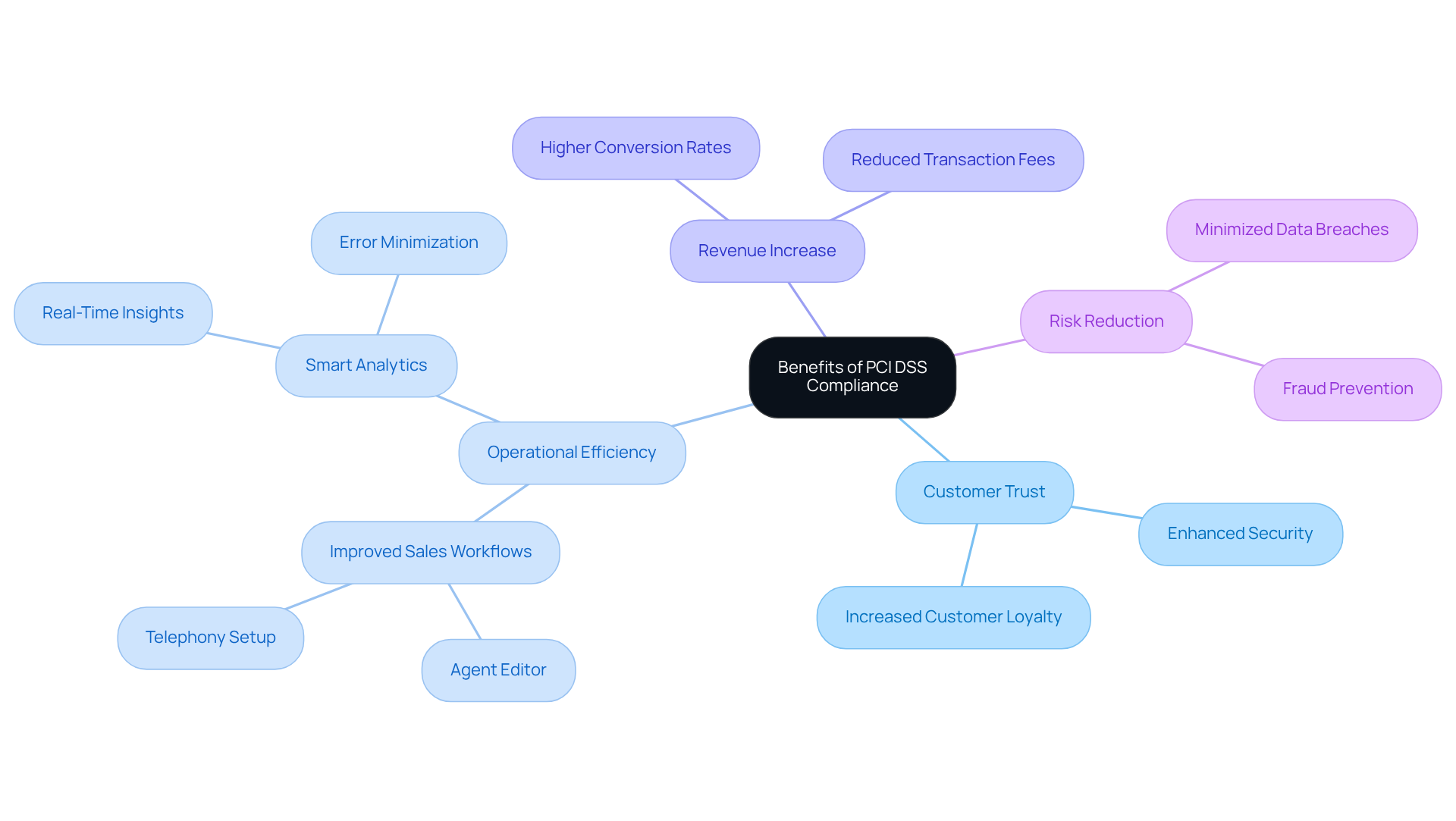
Anticipate Challenges in PCI DSS Compliance
Navigating the complexities of PCI DSS adherence presents common challenges that organizations must confront. A prevalent issue is the lack of awareness among staff regarding the importance of these standards. Additionally, inadequate security measures can leave vulnerabilities exposed, while the ongoing complexity of maintaining compliance over time can overwhelm teams. Sales managers often face resistance from team members who may not fully grasp the significance of adherence or feel daunted by the requirements.
To effectively tackle these challenges, it is imperative for managers to invest in that educate staff on PCI DSS and clarify its implications for their specific roles. Furthermore, the implementation of automated regulatory solutions can significantly streamline compliance processes, alleviating the burden on employees. Regular audits and assessments serve as essential tools to identify potential vulnerabilities and ensure that security measures remain current, thus mitigating the risk of non-compliance. By addressing these challenges head-on, organizations can foster a culture of compliance that not only protects sensitive data but also enhances overall operational integrity.
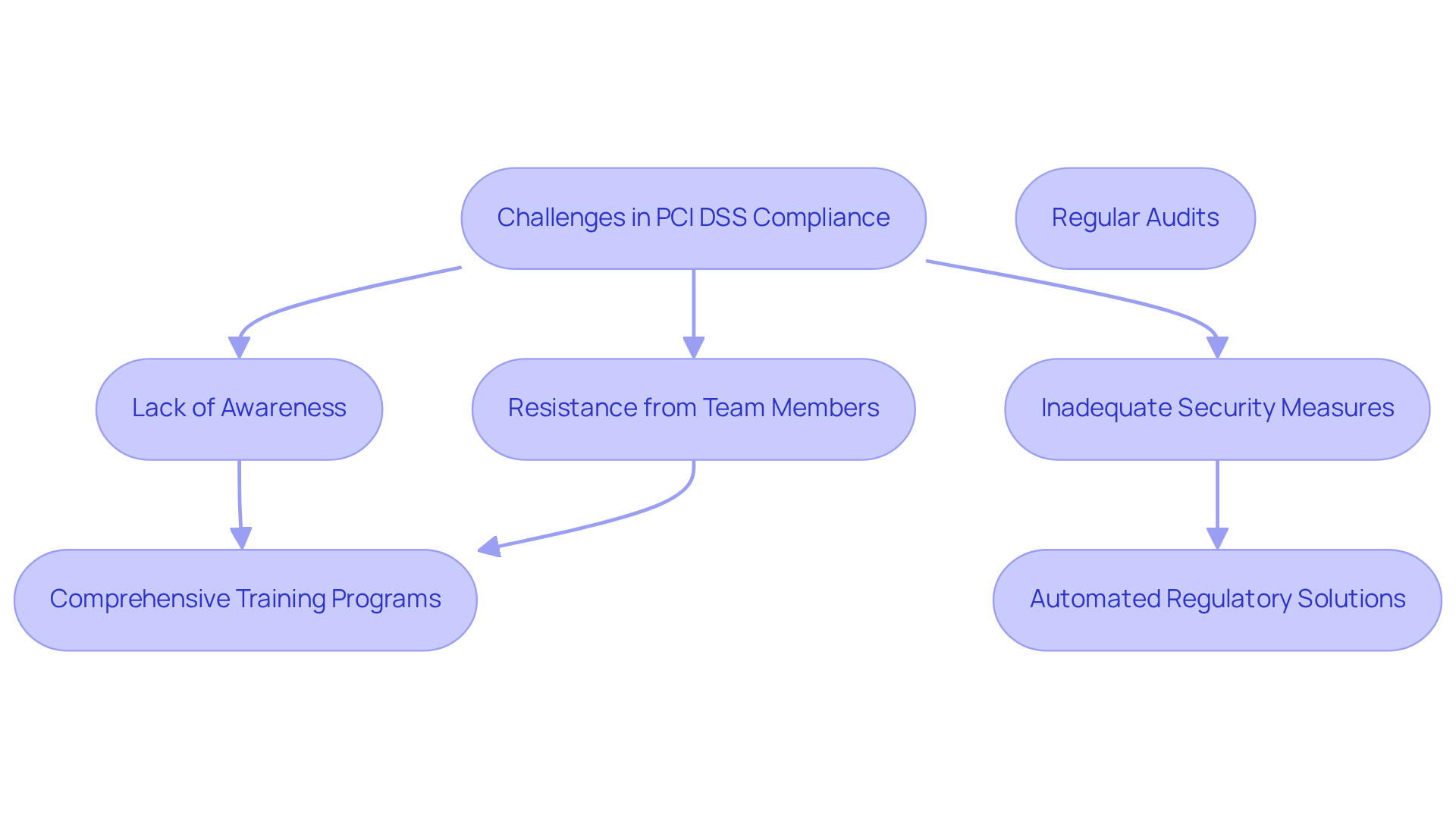
Implement Best Practices for PCI DSS Compliance
To implement best practices for PCI DSS, sales managers must initiate a comprehensive to identify vulnerabilities in their systems. Establishing a culture of security within the organization is paramount; this can be achieved through regular training and awareness programs for all employees. Moreover, leveraging technology such as encryption and tokenization is vital for safeguarding cardholder data during transactions. It is essential to regularly review and update security policies and procedures to adapt to evolving threats. Finally, collaborating with a PCI DSS Qualified Security Assessor (QSA) offers invaluable insights and guidance throughout the PCI DSS compliance process, ensuring that all requirements are effectively met.
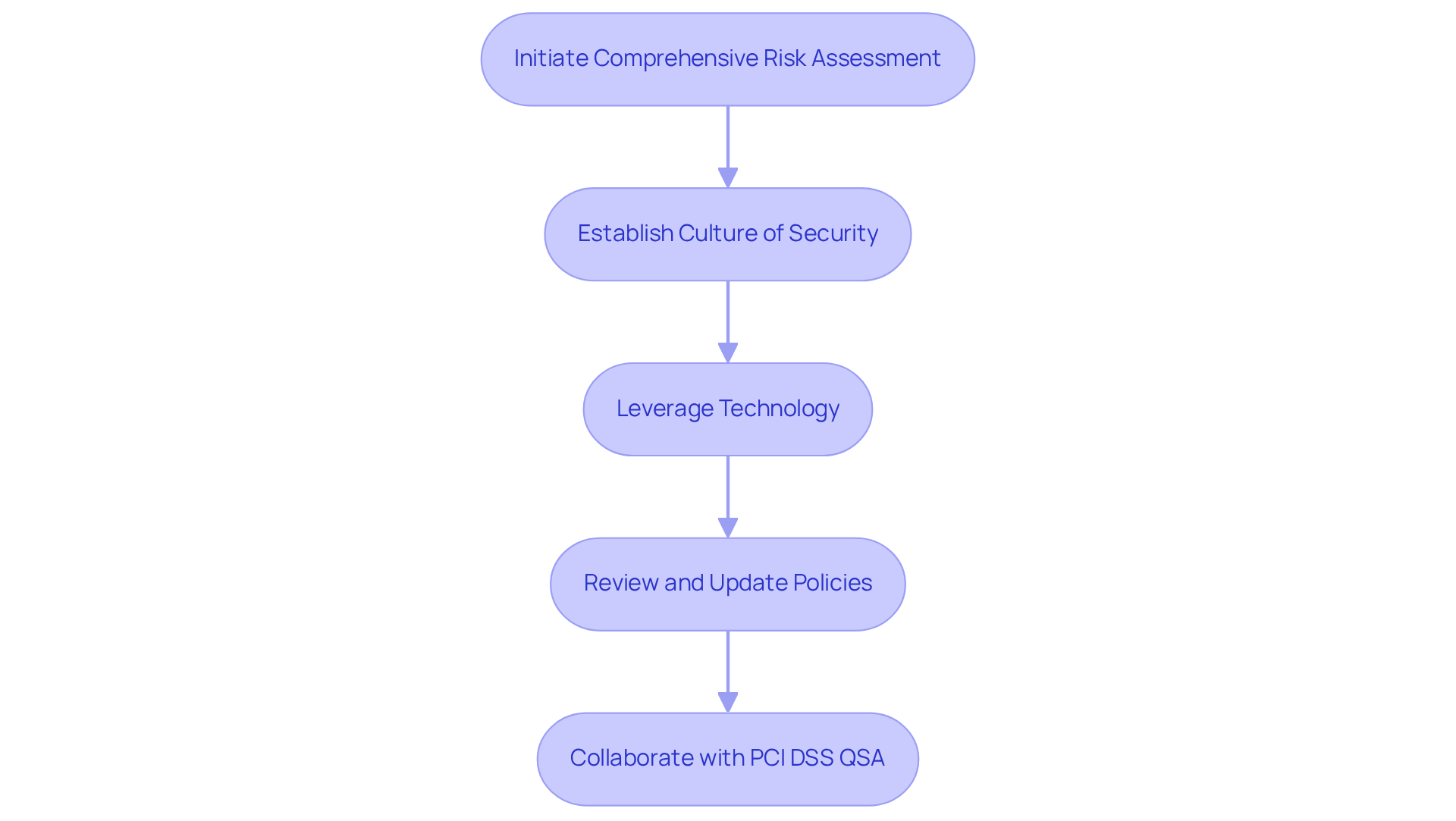
Conclusion
Ensuring PCI DSS compliance stands as a fundamental responsibility for sales managers within the finance sector, establishing a secure environment for handling sensitive cardholder data. By thoroughly understanding and implementing these standards, organizations not only protect themselves from potential breaches and fines but also enhance customer trust and loyalty—critical elements for driving revenue growth.
The article delineates the critical components of PCI DSS compliance, encompassing its six principles, twelve requirements, and various compliance levels. It underscores the necessity of regular training, risk assessments, and the adoption of technology to streamline compliance efforts. Furthermore, recognizing the benefits of achieving compliance—such as improved operational efficiency and reduced transaction fees—highlights its positive impact on overall business performance.
Ultimately, prioritizing PCI DSS compliance transcends mere adherence to regulations; it fosters a culture of security that safeguards customer data and enhances organizational integrity. Sales managers are urged to take proactive steps, including:
- Investing in training
- Leveraging innovative solutions
to navigate compliance challenges and ensure a secure transaction environment. By doing so, they significantly contribute to their organization's success and maintain a competitive edge in the finance industry.
Frequently Asked Questions
What is PCI DSS and why is it important?
The Payment Card Industry Data Security Standard (PCI DSS) is a set of security standards designed to ensure that all entities involved in accepting, processing, storing, or transmitting credit card information operate within a secure environment. Its importance lies in preventing breaches and fraud, which helps maintain customer trust and avoids severe repercussions for non-compliance, such as fines and loss of business.
What are the consequences of non-compliance with PCI DSS?
Non-compliance with PCI DSS can lead to significant consequences, including hefty fines and a detrimental loss of customer trust, which can adversely affect a business's reputation and revenue.
How does PCI DSS contribute to customer trust and revenue growth?
By ensuring compliance with PCI DSS, organizations can create a secure environment that enhances customer trust and loyalty. This trust is vital for driving revenue growth, as customers are more likely to engage with businesses that prioritize the security of their sensitive information.
What are the six principles of PCI DSS compliance?
The six principles of PCI DSS compliance are: 1. Build and Maintain a Secure Network and Systems 2. Protect Cardholder Data 3. Maintain a Vulnerability Management Program 4. Implement Strong Access Control Measures 5. Regularly Monitor and Test Networks 6. Maintain an Information Security Policy
Why is it essential for sales managers to understand PCI DSS principles?
It is essential for sales managers to understand PCI DSS principles to effectively guide their teams in regulatory efforts and enhance compliance. Familiarity with these principles helps ensure that only authorized personnel access sensitive data, which is crucial for maintaining customer trust and safeguarding sales transactions.






